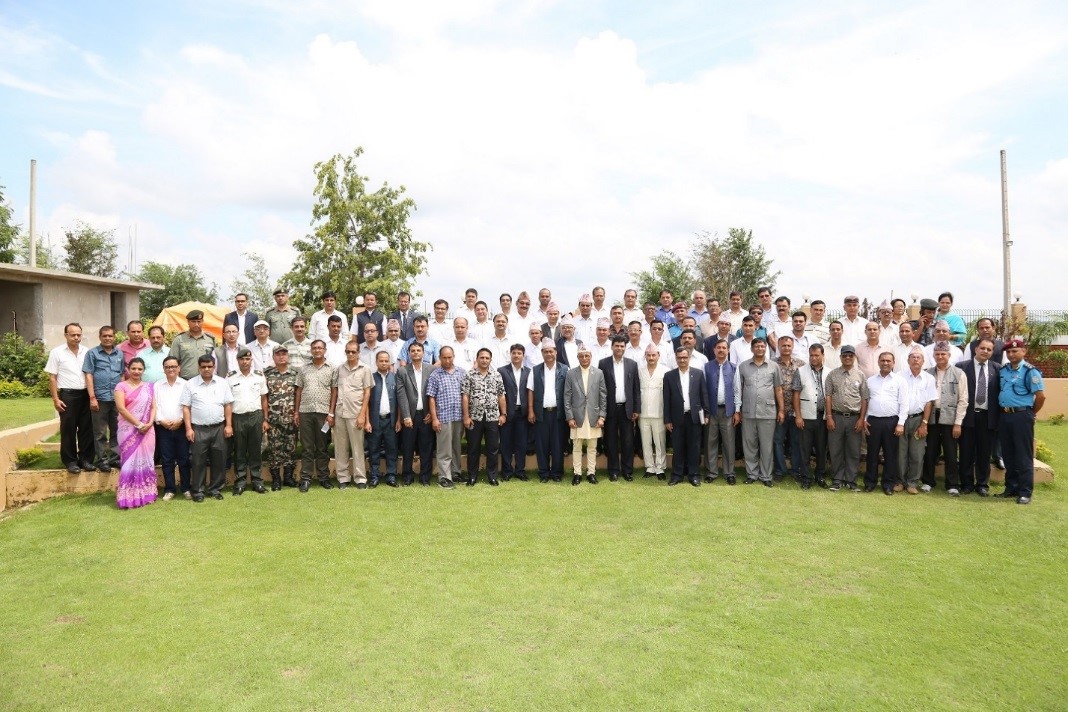As polling day of the third phase of the local elections in Nepal is approaching, the Electoral Support Project (ESP) provided support the Election Commission of Nepal (ECN) in conducting two refresher trainings on election management and administration for 139 Chief Returning Officers and Returning Officers.
One of the trainings, conducted in the town of Simara on 20 and 21 August, was saw the participation of 67 senior government officials, appointed to conduct the elections in the four districts of Bara, Parsa, Rautahat and Sarlahi. The other refresher training, conducted in Janakpur on the same days, had 72 participants, for the four districts of Dhanusha, Mahottari, Saptari and Siraha.

Inaugurating the training in Janakpur, Dr. Ayodhi Prasad Yadav, the Chief Election Commissioner, stated, “Free, fair and credible elections are an essential part of the implementation of the newly promulgated Constitution and this makes the effective execution of the local elections even more valuable to establish democracy in our country.”
Highlighting the role of trainings to the elections officials, he said, “This training to Chief and Returning Officers will produce capable human resources who will contribute to the successful execution of elections.”
Mr. Lekhnath Dhakal, a District Judge from Rautahat, commenting on his participation in the training, confirmed that “the management of elections is not a new task for us, but the refresher training helps us in facing new challenges keeping us up to date on the new knowledge and skills in this arena.”
The trainings were organized with objectives of enhancing the knowledge, ideas and capacity of the appointed Chief Returning Officer and Returning Officers to conduct and successfully manage credible, local elections in Province Number 2; to share issues, problems, learning, challenges and best practices, which are collected from the first two phases of the local elections in Nepal for the further improvement; to discuss the implementation and monitoring of the Code of Conduct; and to ensure timely support and prompt responses to deal with possible issues before, during and after the election.
The training content was designed keeping in mind the requirements for the election officials and the limited time available. A resource book was prepared and produced by the ECN team with technical assistance by ESP.
“Learning has no boundaries. The training provided us with additional practical skills on the changed context of the local elections”, said Mr. Shambhu Raj Regmi, a participant, adding, “It has also been a good forum for sharing our experiences, which itself is important learning for the upcoming local elections and subsequent elections.” Mr. Regmi also stated that the local level elections 2017 has been different than the past elections because of the size of ballot paper and number of candidates to be elected in wards of local units.
A participant in the Janakpur training Ms. Rita Kumari Bakhrel, appointed as a Retuning Officer for the first time, said, “I am really excited to be appointed as a Returning Officer. This informative training helped me in learning from seniors’ field level experience. The exercise of mock polling was very effective for gaining practical knowledge.”
In 2017, with support from the European Union and Norway, ESP assisted ECN in enhancing the capacity of 1,012 Chief/Returning Officers through 35 events.
Photo Credits: UNDP Nepal
The Electoral Support Project- Phase II (ESP) is a technical assistance initiative which focuses on a long-term institutional and professional capacity development of the Election Commission (ECN) for conducting credible, inclusive and transparent elections at a national. The objectives of the project are 1) to strengthen the capacity of the ECN to function as an independent and credible institution, 2) to allow the conduct of the election cycle in an effective, sustainable, and credible manner, and 3) to increase democratic participation, particularly for under-represented and disadvantaged segments of the Nepali society. ESP is currently funded by EU and Norway.
